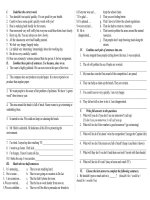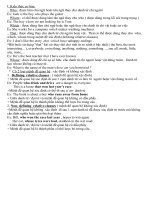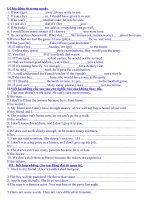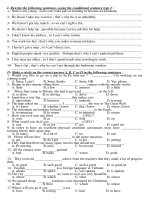DAY THEM TIENG ANH 9
Bạn đang xem bản rút gọn của tài liệu. Xem và tải ngay bản đầy đủ của tài liệu tại đây (179.69 KB, 9 trang )
GRAMMARTICAL POINTS FOLLOWING UNIT OF ENGLISH 6- 7 – 8 – 9
GRAMMAR STRUCTURES
ENGLISH 9
UNIT 1: A VISIT FROM A PEN PAL
A/> USED TO: (Đã từng)
1/ Affirmative: S + used to + bare infinitive
My father used to be a high school teacher.
2/ Negative: S + didn’t use to + bare infinitive
We didn’t use to go to school by bus, but now we do.
3/ Questions: Wh-word + Did + S + use to + bare infinitive?
Where did you use to live when you were a child?
B/> Be/ Get + used to + Noun / V
+ ing
= Quen với = Be / Get + accustomed to + Noun / V
+ ing
Mr Brown has lived in Vietnam for 5 years. He is used to the hot weather.
Mr Lam is a farmer. He gets used to getting up early.
C/> S + be + used to + infinitive/ S + be + used for + V
+ ing
= Được dùng để
This knife is used for cutting meat. It is used to cut meat.
D/> Sentence structures with Wish and If only ( giá mà, ước gì)
1/ For present actions.
S
1
+ wish + S
2
+ unreal past ( V
ed
/ V
2
/ be were / can could)
If only + S + unreal past ( V
ed
/ V
2
/ be were / can could)
I can’t speak Chinese. → I wish / If only I could speak Chinese.
Lan doesn’t understand the grammar lesson. → She wishes she / If only she understood the grammar
lesson.
2/ For future actions.
S
1
+ wish + S
2
+ would / could / were going to + infinitive
If only + S + would / could / were going to + infinitive
We are going to do a test tomorrow. → We wish we/ If only we weren’t going to do a test tomorrow.
Tom won’t come with us on the trip to the countryside. →We wish he/ If only he would come with us on
the trip to the countryside.
3/ For past actions.
S
1
+ wish + S
2
+ had / could have + p.p
If only + S + had / could have + p.p
Tom didn’t go to Mary’s birthday party last night. → Tom wishes he/ If only he had gone there.
I could,’t come to the meeting last night. → I wish I / If only I could have come to the meeting last night.
E/> Structures with It’s time / I’d rather
1/ It’s time + S + past subjunctive
It’s time you studied your lessons./ it’s midnight. It’s time we went home.
2/ I’d rather + S + past subjunctive
I’d rather you cooked dinner. / I’d rather he didn’t go.
***************
UNIT 2: CLOTHING
A/> Passive voice.
I/> Some ordinary Passive Forms.
1/ Modal passive: S + modal verb + be + p.p
Ex: Our house will be repainted by my mother./ A new house is going to be built in this area.
2/ Present simple passive: S + am/ is/ are + p.p
Ex: A lot of rice is grown in Asia.
3/ Simple past passive: S + were / was + p.p
Ex: When the headmaster was away, his work was done by his assistant.
4/ Present cotinuous passive: S + am / is / are + being + p.p
HOANG VAN THU SCHOOL – TEACHER: NGUYEN THUAN
1
GRAMMARTICAL POINTS FOLLOWING UNIT OF ENGLISH 6- 7 – 8 – 9
Ex: I can’t use my car today. It is being serviced in the garage.
5/ Pass continuous passive: S + was/ were + being + p.p
Ex: When we came, a new market was being built in the town center.
6/ Present perfect passive: S + has/ have + been + p.p
Ex: The car can work now. It has just been repaired.
II/> Some special passive forms.
1/ Questions.
Who wrote that play? → By whom was that play written?
Have they read the letter? → has the letter been read?
2/ Material agent.
Smoke filled the room. → the room was filled with smoke.
3/ Negative pronoun agent.
Nobody can unlock the case. → the case can’t be unlocked.
No students can do this execise. → this execise can’t be done by any students.
4/ Sentences with two objects.
Mary’s parents gave her a birthday present.
→ Mary was given a birthday present by her parents.
→ A birthday present was given to Mary by her parents.
5/ Sentences with: People think/ consider/ believe …
People think that he is living abroad.
→ It is thought that he is living abroad.
→ He is thought to be living abroad.
B/> The present perfect tense.
I/> Form:
• Affirmative: S + has/ have + p.p
• Negative: S + has/ have + not + p.p
• Interrogative: Wh- word + has/ have + S + p.p?
II/> Use:
1. Repeated events . Ex: We have often seen Jim and his dog in the park.
2. Indefinite past events . Ex: I have met that man.
3. Unfinished actions with Since/ For . Ex: She has worked for this company for 5 years.
4. Expriences . Ex: Have you ever eaten Japanese food? – No, I’ve never eaten it. We have visited 5 countries
so far.
5. Completion . Ex: we have already done our homework.
6. Recent events .Ex:Mary has just phoned from the airport./ My grandma hasn’t felt well recently.
***************
UNIT 3: TRIP TO THE COUNTRYSIDE
A/> Modal Could / Would with Wish. ( Review Unit 1 )
B/> Adverb clauses of results.
1/ Main clause + so + Result clause
Our suitcases were very heavy, so we took a taxi.
The teacher was ill, so the class was cancelled.
2/ S + V + so + Adjective / Adverb + that + S + V
He was so ill that we had to send for a doctor.
She spoke so softly that I could hardly hear her.
3/ S + V + so + many + countable noun / (much + uncountable noun ) + that + S + V
She put so much sugar in the coffee that she couldn’t drink it.
I have so many books that I can’t read them all.
4/ S + V + so + few + countable noun / ( little + uncountable noun ) + that + S + V
HOANG VAN THU SCHOOL – TEACHER: NGUYEN THUAN
2
GRAMMARTICAL POINTS FOLLOWING UNIT OF ENGLISH 6- 7 – 8 – 9
There were so few students that the class had to be cancelled.
I had so little free time that I could hardly see any films.
5/ S + V + such + (a / an) + adjective + noun + that + S + V
I saw such a funny cartoon that I couldn’t help laughing.
C/> Prepositions of time.
IN:
in the morning, in the afternoon, in the evening
in march, in 1999, in the winter, in the 20
th
century
in an hour, in a minute, in a week, in a moment
in the beginning, in the end, in a day
ON:
on August 8
th
, on Tuesday, on weekdays, on Christmas day
on Monday morning, on a fine sunny day
AT:
at 9 o’clock, at midnight, at noon, at dawn, at lunchtime
at Christmas, at Easter, at Ramadan, at the beginning
at the end, at least, at the moment, at present, at times
***************
UNIT 4: LEARNING A FOREIGN LANGUAGE
A/> Modal verbs with conditional sentences ( Type 1)
Form: If clause + Main clause
If clause (Present tenses: simple present/ present continuous/ present perfect) + Main clause ( will, can/ may,
might/ must, have to/ should, ought to + infinitive).
Ex:
If Tom studies harder, he will past the exam.
If father is sleeping, you can go out.
If you give me your willing help, I may get success.
If Mary has finished her work, she may go home.
If you want to get good marks, you must study harder.
If you want to become a doctor, you have to go to University of Medicine.
If you want to be healthy, you should/ ought to do morning execises regularly.
B/> Reported speech.
1/ Statements.
Form: S + said that/ said to/ told + Object + that + S + V( changed) + O.
Direct : He said, “ I’ll lend you my book, Alice”.
Reported : He told Alice that he would lend her his book.
2/ Wh- questions:
Form: S + asked /wanted to know + O + wh- word + S + V( changed) + O.
Direct : She said, “ Where are you going now, Tom?”
Reported : She asked Tom where he was going then.
3/ Yes- No questions:
Form: S + asked /wanted to know + O + if / whether +S + V( changed) + O.
Direct : She said, “ Do you go to school today, my son?”
Reported : She asked her son if he went to school that day.
4/ Imperatives:
Form: S + asked/ told/ ordered/ forced / advised / begged + Oject + To- infinitive/ Not to- infinitive.
Direct : She said,” Open the windows, please”.
Reported : She told me to open the windows.
Direct : He said, “ Don’t be late for school, Alice”.
HOANG VAN THU SCHOOL – TEACHER: NGUYEN THUAN
3
GRAMMARTICAL POINTS FOLLOWING UNIT OF ENGLISH 6- 7 – 8 – 9
Reported : He advised Alice not to be late for school.
NOTES:
1/ Khi động từ tường thuật ở các thì hiện tại (simple present/ present continuous/ present perfect ) hay tương lai
thì ta không đổi thì của động từ cũng như các từ chỉ thời gian và nơi chốn.
Ex : She says “ I will go there with you today”.
Reported : She says that she will go there with me today.
2/ Khi động từ tường thuật ở thì quá khứ ta tiến hành đổi thì của động từ cũng như các từ chỉ thời gian và nơi
chốn từ câu trực tiếp sang câu gián tiếp như sau.
Direct Speech Reported Speech
Simple present Simple past
Present cotinuous Past cotinuous
Present pefect Past pefect
Simple past Past pefect
Past perfect Past pefect
Present pefect cotinuous Past pefect cotinuous
Will/ can/ may Would / could / might
Would / should / could Would / should / could
Used to / ought to Used to / ought to
Today That day
Yesterday The day before/ the previous day
Tomorrow The next day/ the following day
Now Then, at once
Ago Before
Last week The previous week
Here There
This That
These Those
* Sentences with: Wish / If only/ It’s time + S + past subjunctive / would rather + S + past subjunctive /
conditional sentences ( Type 2, 3) → Không đổi
***************
UNIT 5: THE MEDIA
A/> Tag questions.
1/ General rule:
Affirmative statement, negative tag-question./ Negative statement, affirmative tag-question
Ex: Your brother likes watching foreign films, doesn’t he?/ Mary has never been late for class, has he?
2/ Some exceptions.
a) Let’s go to the cinema, shall we?
b) Open the windows, will you?
c) Somebody came here yesterday, didn’t they?
d) Everything will be all right, won’t it?
e) I am always on time for class, aren’t I?
B/> Gerund ( V
+ ing
) after some verbs
1/ mind, enjoy, finish, like, dislike, love, hate, avoid, practice, feel, imagine, deny, admit, keep, suggest, risk.
Ex: Tom enjoys watching TV, he dislikes playing football.
2/ Phrasal verbs: give up, go on, keep on, insist on …
Ex: Mr. John gave up looking for a new job. He insisted on doing his old job again.
3/ Prepositions + V
+ ing
Ex: I am interested in listening to pop music.
4/ Expressions + V
+ ing
.
Can’t stand / Can’t help / It’s worth / It’s no use/ It’s no good + V
+ ing
HOANG VAN THU SCHOOL – TEACHER: NGUYEN THUAN
4
GRAMMARTICAL POINTS FOLLOWING UNIT OF ENGLISH 6- 7 – 8 – 9
***************
UNIT 6: THE ENVIRONMENT
A/> Adjectives and adverbs.
I/>Adjectives: Modifying Nouns and Pronouns
1/ Attributive adjectives.
a. Before nouns: Ex: Tom is a happy boy./ We are looking at a beautiful girl.
b. After pronouns: Ex: Something strange happened./ He found nothing valuable in the house.
c. After liking verbs:Ex: My father becomes old and weak.
2/ Predicative adjectives.
a. Afetr nouns: Ex: I saw a baby asleep.
b. After liking verbs: Ex: The girl was alive and well.
II/ Adverbs: Modify verbs, adjectives and adverbs
1. After verbs, after objects: Ex: He runs fast./ He always drives his car carefully.
2. Before adjectives: Ex: I’m terribly sorry./ You are absolutely right.
3. Before adverds: Ex: He ran very fast./ He ran extremely fast.
4. Adverbs of manner: Adjective + ly = Adverbs of manner
Ex: Careful – carefully; happy – happily; quick – quickly
5. Some adverbs have the same form with adjectives: fast, late, hard.
Ex: Work hard and you will succeed.
* Note: well/ good → well
B/>Adverb clauses of Reason.
Main clause + Adverb clause of Reason ( As/ Since/ Because + S + V )
Ex: John wants to go home as / since / because he feels sick.
C/> Adjectives + that + clauseAshamed / Sorry / Afraid / Disappointed that + clause
Ex: I’m afraid that I can’t join the trip to the zoo with you tomorrow. / Tom isn’t sure that he will win.
S + be + important / essential / necessary/ anxious + that + S + should + infinitive
V ( base form) (present subjunctive)
Ex: it’s necessary that she (should) do her duty.
D/> Conditional sentences
1/ Type 1:
Main clause (will/ can/ may + infinitive) If clause (present tense: simple present/ present perfect/ present
continuous)
• Conditions: real, probable
• Time: present or future
Ex: Tom will pass the final exam if he studies harder.
2/ Type 2: Main clause ( would/ could / might + infinitive) If clause ( Past subjunctive)
• Conditions: unreal, impossible
• Time: present
Ex: If my mother were here now, she would help me.
***************
UNIT 7: SAVING ENERGY
A/> Connectives.
1/ Coordinating conjunctions.
and ( và ) :Tom is unsocial and he can be quite rude.
but ( nhưng ) :Tom is unsocial but he has a few friends.
for ( vì ) :Tom is unsocial for he is afraid of crowds.
or ( hoặc ) :Tom is unsocial or at least he seems that way.
HOANG VAN THU SCHOOL – TEACHER: NGUYEN THUAN
5









